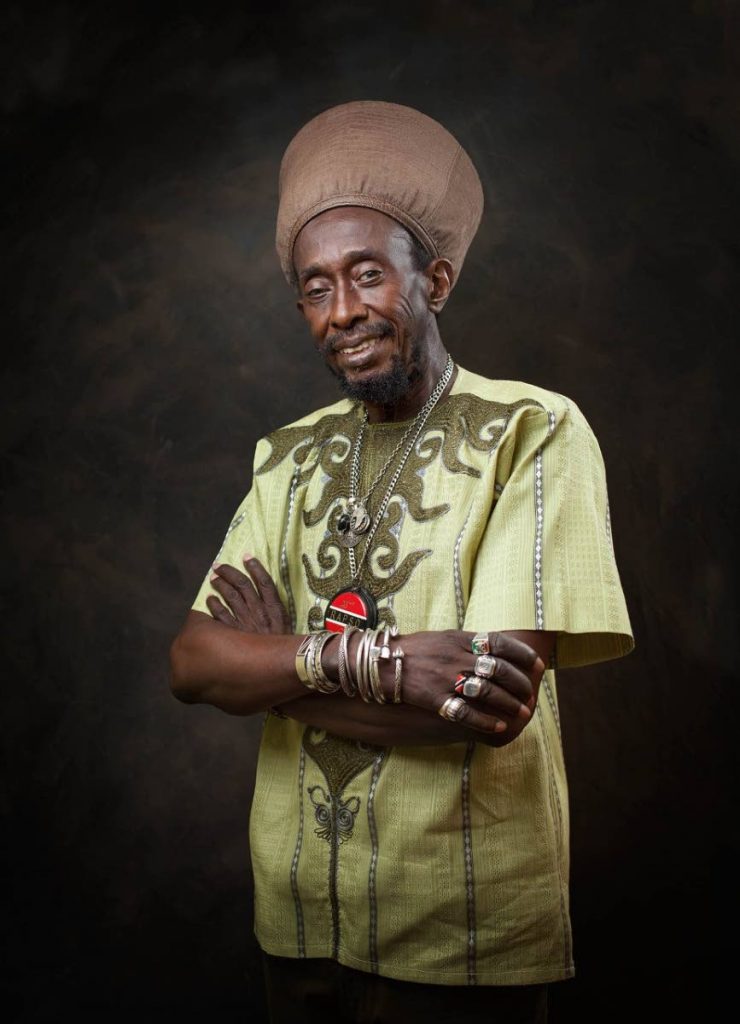Final rites for Bro Resistance – 'A humble man who conquered the world'

TO HIS brother, family and friends, Lutalo “Brother Resistance” Masimba will be remembered as, “A humble man who conquered the world.”
The celebration of life ceremony for the late Trinbago Unified Calypsonians Organisation (TUCO) president is now available for viewing by the public on www.tntcarnivalworld.com.
The National Carnival Commission (NCC) said in a release that streaming of the recorded service for the late musical and cultural icon was available from Monday on the platform.
“The uploaded ceremony is free to view and easily accessible to the public simply by logging on to tntcarnivalworld.com today (Monday, July 26), and clicking the ‘What’s Happening’ tab at the top of the page,” the NCC said.
The three-hour long long video shows the eulogy delivered by Resistance's brother Neil Lewis as well as tributes by his children and friends and performances by Austin “SuperBlue” Lyons and composer and arranger Len “Boogsie” Sharpe.
The media was not invited to the actual ceremony which was held on July 23.
'HE TOURED THE WORLD'
In his eulogy Lewis said his brother performed on five of the world’s seven continents: North America, South America, Asia, Africa and Europe.
He said Resistance would recall some of his performances, among them being the opening act for a Roberta Flack concert in Central Park, New York in 1999.
“Wherever he performed he would conduct lectures and workshops on the TT culture,” Lewis said.
He spoke of Resistance’s many achievements, among them being TUCO’s president for the past ten years, his publications including his 1986 Rapso Explosion and the playing role of Aldrick from Earl Lovelace’s The Dragon Can’t Dance, for which he was nominated for a Cacique Award in 2002.
“He won several awards and the highest honour he achieved was being awarded a national award, the Hummingbird medal by the Government in 1992.”
Lewis said in the early days of Resistance’s career when he and the Network Rapso Riddum band were now starting to make their mark, there were many who did not endorse what they were doing.
People only learned Brother Resistance had a university degree during an interview with the late television and radio announcer Dale Kolasingh on AVM television’s programme Portraits, Lewis said.
“He told me that after that interview people who would pass him silently on the street in the past, were now stopping him and wanting to know him.”
He said Resistance never made anyone feel that because he had his degrees he was better than any of them.
He said in primary school, Resistance whose name was then Roy Lewis, started writing poetry and continued doing so at Queen’s Royal College (QRC).
Lewis who joined Resistance at QRC described his brother as being, “the lifeblood of the first 11 football team at QRC.”
“He was creating chants to inspire the team on the field during Intercol competition as well as stencilling t-shirts for supporters.
“But he truly made his mark when he entered a school’s disc jockey competition and won.”
He was told he needed to go with a sobriquet to perform and his schoolmate said, “‘You always resisting everything so you should go with the name, Resistance.’”
Their father George Lewis was not pleased about Resistance’s decision to choose entertainment as a career, Lewis said.
“I too in my early years did not always understand him but I will always remember him rehearsing a piece called Pan Baby while he was in the shower and I could not figure out what he was doing.
FROM ROY TO RESISTANCE
“However, he won a competition with Pan Baby and represented TT at Carifesta V in Barbados with that performance.”
He said their father’s view changed when Brother Resistance launched Rapso Explosion at Central Bank Auditorium. In 1982, Brother Resistance changed from Roy Lewis to Lutalo Makossa Masimba.
When he asked Masimba what his name meant, Brother Resistance told him Resistance Musical Power. He researched it and saw that it meant exactly what he said.
“Resistance did not do things by vaps but there was always something coming from within as to why he would do things.”
Lewis said Brother Resistance was heavily influenced by the 1970 Black Power Movement and the then scenes of injustices taking place around the world.
Lewis said he got closer to Brother Resistance when their father died in 1989 and started attending his events and so developed a connection to him and his work.
He described Resistance as a visionary and knew where he wanted his music to go. Lewis recalled his brother creating a media event in 1989 and declaring it as the National day of Rapso.
On Emancipation mornings, Brother Resistance would lead the Network Rapso Riddum band each year at the street procession, ringing his bell of liberation.
“When you saw him on that day, you could see and feel his joy. It was as if he was being liberated from slavery every Emancipation Day.”
Resistance had a strong connection with youth and his event Children's Story Time was one of his pet projects. He would get sponsors to purchase tickets for children from the orphanages to attend.
He said Brother Resistance had been diagnosed with Chronic Obstructive Pulmonary Disease (COPD) which was a result of many years of smoking cigarettes.
“He was getting regular treatments and I began managing his health appointments from since that time. He had been going very well until two months ago when a scan revealed cancer had developed in his right lung,” Lewis said.
He added that he faced it head on and continued his roles at TUCO and NCC while working on his PhD.
He said a couple of days before he died he began to feel unwell and they took him to Westshore Medical Private hospital on July 13 where he died shortly after. “So his death was truly sudden,” Lewis said.

Comments
"Final rites for Bro Resistance – ‘A humble man who conquered the world’"